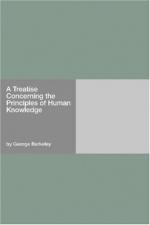39. The term idea preferable to thing.—If it be demanded why I make use of the word idea, and do not rather in compliance with custom call them things. I answer, I do it for two reasons:—first, because the term thing in contra-distinction to idea, is generally supposed to denote somewhat existing without the mind; secondly, because thing has a more comprehensive signification than idea, including spirit or thinking things as well as ideas. Since therefore the objects of sense exist only in the mind, and are withal thoughtless and inactive, I chose to mark them by the word idea, which implies those properties.
40. The evidence of the senses not discredited.—But, say what we can, some one perhaps may be apt to reply, he will still believe his senses, and never suffer any arguments, how plausible soever, to prevail over the certainty of them. Be it so; assert the evidence of sense as high as you please, we are willing to do the same. That what I see, hear, and feel doth exist, that is to say, is perceived by me, I no more doubt than I do of my own being. But I do not see how the testimony of sense can be alleged as a proof for the existence of anything which is not perceived by sense. We are not for having any man turn sceptic and disbelieve his senses; on the contrary, we give them all the stress and assurance imaginable; nor are there any principles more opposite to Scepticism than those we have laid down [Note.], as shall be hereafter clearly shown.
[Note: They extirpate the very root of scepticism, “the fallacy of the senses.”—Ed.]
41. Second objection.—Answer.—Secondly, it will be objected that there is a great difference betwixt real fire for instance, and the idea of fire, betwixt dreaming or imagining oneself burnt, and actually being so: if you suspect it to be only the idea of fire which you see, do but put your hand into it and you will be convinced with a witness. This and the like may be urged in opposition to our tenets. To all which the answer is evident from what has been already said; and I shall only add in this place, that if real fire be very different from the idea of fire, so also is the real pain that it occasions very different from the idea of the same pain, and yet nobody will pretend that real pain either is, or can possibly be, in an unperceiving thing, or without the mind, any more than its idea.
42. Third objection.—Answer.—Thirdly, it will be objected that we see things actually without or at distance from us, and which consequently do not exist in the mind; it being absurd that those things which are seen at the distance of several miles should be as near to us as our own thoughts. In answer to this, I desire it may be considered that in a dream we do oft perceive things as existing at a great distance off, and yet for all that, those things are acknowledged to have their existence only in the mind.




